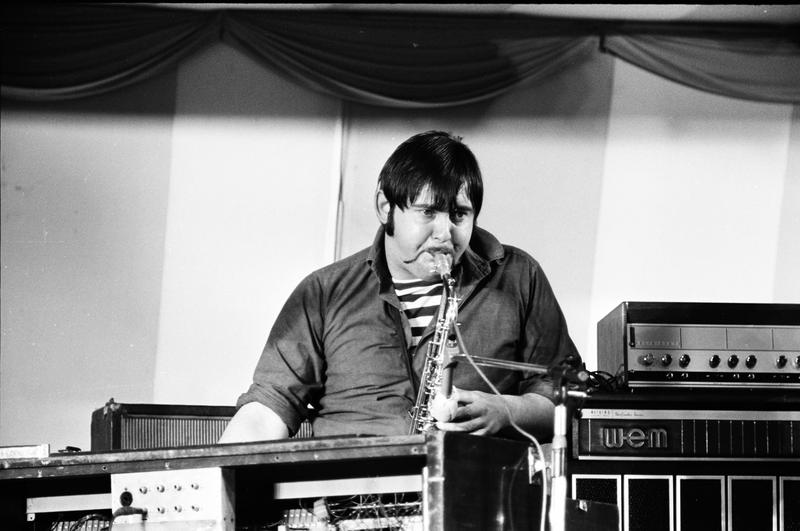The Legacy Of Graham Bond
By | November 30, 2018

His full name was Graham John Clifton Bond and he was born on October 28, 1937, in Romford, Essex. Though he suffered from asthma as a child, that did not deter him from pursuing his passion for music. He took up the piano at an early age before moving on to the cello and the oboe. At the age of fourteen, he began practicing a form of breathing yoga to help manage his asthma. At this time, he also began to play the saxophone in an effort to strengthen his lungs. He formed his first band, the Terry Graham Trio, with Terry Lovelock and Colin Wild, but was not met with much success and had to supplement his income by day as a refrigerator salesman.

His attempts to join the London Jazz scene were also not well-received, largely due to his unique style on the saxophone. He did a brief stint in Majorca as a cocktail pianist before returning to England where he reunited with Lovelock and other artists to form the Terry Graham Quartet. A turning point in his career came in 1960 when he met pro jazz musician Dick Heckstall-Smith, who was impressed with his alto sax playing. Shortly thereafter, Bond married pianist Diane Eton and joined the Goudie Charles Quintet. He stayed with them for a year before once again reuniting with Lovelock in the Don Rendell Four, which became five with the addition of Bond. They recorded their debut album, Roarin’, for the U.S. label Jazzland, though by that time Lovelock had been replaced as the drummer. The New Don Rendell Quintet was only the second British jazz group to release on an American label.

Despite his success with the Don Rendell Quintet, Bond left the group in 1962, looking to do something different. He joined with Heckstall-Smith and Alexis Korner, among others, to form Blues Incorporated. It was at this time that Bond introduced the Hammond organ, occasionally playing as a trio with bandmates, Jack Bruce and Ginger Baker. The trio was so successful that they eventually left Blues Incorporated, causing a falling out with Korner. They were eventually joined by guitarist John McLaughlin to form the Graham Bond Quartet. Their first release was a cover of the Beatles’ “I Saw Her Standing There.” Eventually, McLaughlin was replaced by Heckstall-Smith and the group name became the Graham Bond Organization.

In July 1965, while the band was promoting their single, “Lease on Love,” on a show called Ready Steady Go!, Bond demonstrated the Mellotron, an instrument similar to the modern-day keyboard with prerecorded instrumental sounds. Their second album, There’s A Bond Between Us, was the first rock recording to use the instrument.
By 1966, despite two albums and numerous singles, the band was not faring well financially. Additionally, several of the band members, Bond included, had developed drug addictions. At the same time, Bond’s marriage had failed. As a result, the band began to fall apart.

By October 1966, Bond had broken his heroin addiction. For financial reasons, the band was reduced back to a trio, consisting of Bond, Heckstall-Smith, and drummer Jon Hiseman, who had replaced Baker. The trio released a single, “You Gotta Have Love Babe,” which was poorly received. Eventually, Hiseman and Heckstall-Smith moved on and Bond formed a new band with Ray Russell and Alan Rushton. After they left too, Bond continued to release under the Organization banner but featuring different musicians.
In 1968, Bond met Diane Steward. He had long been fascinated with magic; she shared this interest and they eventually married. He also joined with a Dutch group called The Fool, with whom he would release his worst album yet. During this time, Bond started using heroin again and suffered a breakdown which led to his wife taking him to a mental hospital. After moving to Los Angeles with Diane and her daughter, Bond began working on his own album, but the songs were heavily influenced by his obsession with the occult and the album performed terribly. After a second failed album, they traveled to Jamaica to visit Diane’s relatives only to get stuck there with no money to leave.

When they finally made it back to England, Bond formed a new band, the Graham Bond Initiation. At the same time, he reunited with Ginger Baker in a project called Airforce. Despite Bond being arrested twice on two-year-old bankruptcy charges, both projects did well, though eventually Airforce took off (pun intended) and Initiation faded away. When Airforce also disbanded in 1971, Bond was quick to form yet another band, which he called Graham Bond With Magick. That band also fell apart within a few months, but Bond continued to make music with Pete Brown.
Bond and Brown eventually disbanded as well due to Bond’s uncontrollable behavior, which included his obsession with magic as well as drug use. He split with Diane after she learned he had sexually abused her daughter. He was arrested for possession of marijuana and once again spent time in a mental hospital. He continued to experience depression after leaving the hospital and on May 8, 1974, he was killed after allegedly jumping in front of a tube train at Finsbury Park Station.
